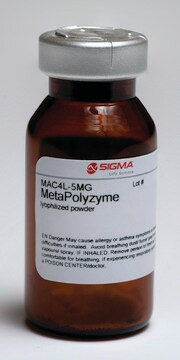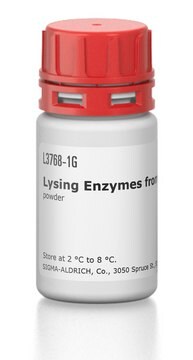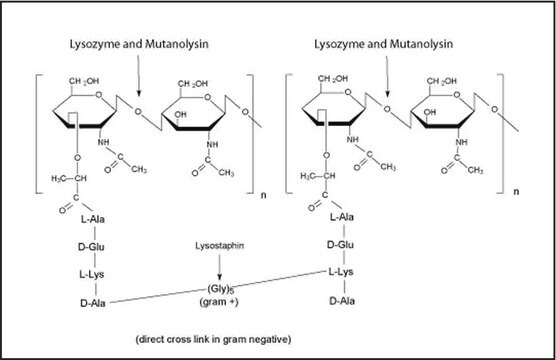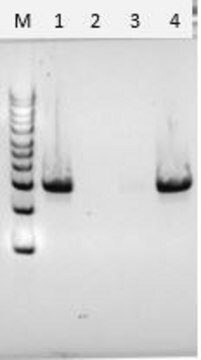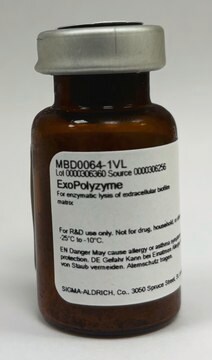SAE0200
MycoPolyzyme
for use with yeast and fungal lysis, free of DNA contaminants, suitable for Microbiome research
Sign Into View Organizational & Contract Pricing
All Photos(1)
About This Item
UNSPSC Code:
12352204
NACRES:
NA.77
Recommended Products
General description
Lytic Enzyme Mixture is a mix of two enzymes: lyticase and chitinase, which have been proven useful in fungal and yeast lysis for microbiome studies. Lyticase is preferred to digest cell walls of yeast and generate spheroplasts from fungi for transformation. Chitinases have been detected in many microorganisms and in plants. In fungi, chitinases assist in morphogenesis, to break down the inherent chitin content of fungal cell walls. Plant chitinases help in resistance to fungal attack and counteracting fungal growth, by targeting those same fungal cell walls. In bacteria, bacterial chitinases assist in utilizing chitin as a carbon source and as an energy source. The mixture of the two enzymes has also been tested to ensure absence of microbial DNA.
Application
The study of microbial communities has been revolutionized in recent years by the widespread adoption of culture independent analytical techniques such as 16S rRNA gene sequencing and metagenomics. Since DNA contamination during sample preparation is a major problem of these sequence-based approaches, DNA extraction reagents free of DNA contaminants are essential. Lytic Enzyme Mixture undergoes strict quality control testing to ensure the absence of detectable levels of contaminating microbial DNA using 35 cycles PCR amplification of 16S and 18S rDNA using universal primer sets.
Components
The enzymes in Lytic Enzyme Mixture are:
The enzymes are tested for absence of contaminating microbial DNA using 16S and 18S PCR amplification.
- Lyticase
- Chitinase
The enzymes are tested for absence of contaminating microbial DNA using 16S and 18S PCR amplification.
Signal Word
Danger
Hazard Statements
Precautionary Statements
Hazard Classifications
Resp. Sens. 1
Storage Class Code
11 - Combustible Solids
WGK
WGK 3
Choose from one of the most recent versions:
Certificates of Analysis (COA)
Lot/Batch Number
Sorry, we don't have COAs for this product available online at this time.
If you need assistance, please contact Customer Support.
Already Own This Product?
Find documentation for the products that you have recently purchased in the Document Library.
Our team of scientists has experience in all areas of research including Life Science, Material Science, Chemical Synthesis, Chromatography, Analytical and many others.
Contact Technical Service